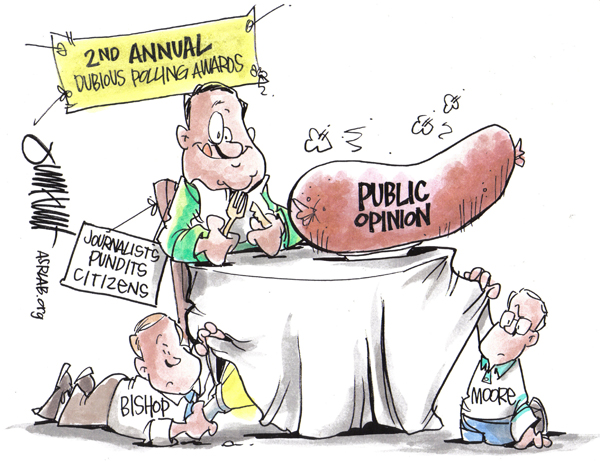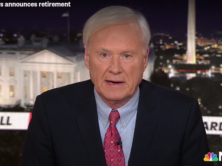
StinkyJournalism's poll skeptics columnists' 2010 Dubious Polling Awards report was the most read StinkyJournalism news story in 2010. (Credit: Jim Hunt)
The most read iMediaEthics’ news stories of 2010…
1. iMediaEthics’ annual top ten “Dubious Polling” awards attracted the most readers this year. See here “2010 Top Ten “Dubious Polling” Awards” by pollsters David Moore and George Bishop. The two veteran poll experts and academics highlighted the least reliable polls they saw in 2009. Keep an eye out for the Third Annual Dubious Polling Awards in early January.
2. “Rebutting Jared Diamond’s Savage Portrait: What tribal societies can tell us about justice and liberty” is the second most popular news story in 2010 and the tenth report in a series about Jared Diamond’s controversial New Yorker article, “Annals of Anthropology: Vengeance is Ours.” Read here the April 28 essay by Paul Sillitoe & Mako John Kuwimb.
3. The first installment in a series on Kansas reporter and one-time Society of Professional Journalists presidential candidate Ron Sylvester’s undisclosed conflict of interest, titled “Wichita Eagle Court Reporter Doesn’t Disclose His Wife’s Firm Represents ‘Pill Mill’ Defendants.” The May story by Sydney Smith (here), introduces the conflict Sylvester has in reporting on the Stephen and Linda Schneider case. Sylvester’s wife is a partner at one of the law firms defending the Schneiders, but — without disclosure — Sylvester writes the Eagle’s coverage about the Schneiders for many years.
4. Journalism professor and iMediaEthics’ columnist, Robert Buckman, addressed the media’s habit of convicting suspects, persons of interest and ordinary people before a trial in his Aug. “Faux Pas Files” column, “Kyron Horman’s Stepmom, Terri: Convicted by the media before any arrest?” (see here).
5. Pollster and poll skeptic George Bishop used his September column to take a closer look at the media polls about the so-called Ground Zero Mosque. See his column, “What Do Ground Zero Mosque-and-Muslim Media Polls Tell Us?” here. Bishop also advised how pollsters could re-phrase questions to the public so they are less biased and loaded.
6. In May, iMediaEthics received a complaint about a photo composite in Newsweek not being labeled as such. Our investigation and June story detailing how iMediaEthics got Newsweek to label the composite image as such in its online edition, “Newsweek Corrects Photo Caption to Disclose Image is Illustration,” by Sydney Smith, is here.
7. Poll skeptic, author and academic David Moore detailed his struggles in holding Pew Research Center accountable. In his July report, “Pew’s Credibility Gap: A Strange Tale of What Passes for Transparency Among America’s Polling Leaders,” Moore attempts to hold Pew accountable for changing their method statement to fix its inconsistency with poll results after he challenged them. Moore’s story chronicles the changing statements that Pew representatives and leaders made as explanation. See his report here.
8. This summer, iMediaEthics studied ten top U.S. newspapers and their blogs. We asked: Are blogs edited? The final report, “iMediaEthics Study: 68% Ten Top US Newspapers’ Blogs are Edited,” by Claudia Haas and Sydney Smith, presents the study’s surprising findings. See the story here.
9. Journalism professor Robert Buckman addressed common spelling errors in his March “Faux Pas Files” column “For Want of a Tilde, the Spelling is Wrong!” Buckman highlighted several ways the media misspells words by dropping accent marks and characters from non-English languages, like the tilde. See Buckman’s column here.
10. Rolling Stone’s profile of Gen. Stanley McChrystal stirred quite a bit of controversy this summer as journalists questioned the reporting by Rolling Stone freelancer Michael Hastings and McChrystal stepped down from his post. Robert Buckman addressed the profile in his June column (here) titled, “Rolling Stone’s McChrystal Profile: The Right, the Wrong, and the Ugly,” Buckman highlighted what he thought about unnamed sources in what he judged overall as an even handed piece of journalism.







Comments Terms and Conditions